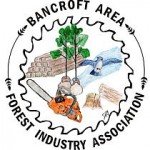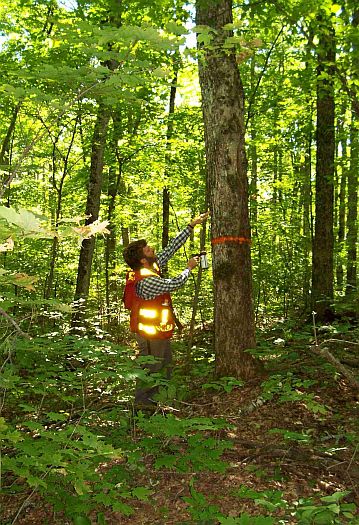Bancroft Area Forest Industry Association
Who We Are
 The Bancroft Area Forest Industry Association (BAFIA) is an incorporated group of forestry companies ranging from loggers, sawmill operators, foresters, forest technicians, woodlot owners and managers who operate on both crown and private land. Many of our members are small, family owned businesses with some serving our community for over 100 years. As a group we gather every month to voice our concerns and develop action plans to confront the issues facing our industry today. The geographic area of BAFIA and the majority of its members are defined as those lands that fall between Madoc north to Whitney and Denbigh west to Haliburton and Minden in the province of Ontario, Canada.
The Bancroft Area Forest Industry Association (BAFIA) is an incorporated group of forestry companies ranging from loggers, sawmill operators, foresters, forest technicians, woodlot owners and managers who operate on both crown and private land. Many of our members are small, family owned businesses with some serving our community for over 100 years. As a group we gather every month to voice our concerns and develop action plans to confront the issues facing our industry today. The geographic area of BAFIA and the majority of its members are defined as those lands that fall between Madoc north to Whitney and Denbigh west to Haliburton and Minden in the province of Ontario, Canada.
Commitment to Sustainability
Do you have wood products on your property? Do you want to manage your land in a sustainable manner?
We believe that sustainable forestry practices are necessary for both the environment and business. Our commitment to sustainability can be found through our “Standards of Practice” (see below). Please refer to our “Directory of Services” where you find companies who have acquired the skills to practice sustainable forestry and can provide the services you need to achieve your forest management goals.
STANDARDS OF PRACTICE
The Standards of Practice described herein have been adopted as the minimum standards to be followed by BAFIA members when operating on private land. When operating on Crown land, BAFIA members are expected to meet the standards required by the Crown Forest Sustainability Act.
Enforcement of the Association’s Standards of Practice on private land will be on a complaints-basis. Landowners who feel that a member has not met these standards when operating on their property may file a written complaint with the Association. Complaints of malpractice by members will be investigated promptly, either by the Association or by an independent third party named by the Association for this purpose.
A member who has been found to be operating contrary to these standards may be disciplined by the Association. Discipline may be in the form of required training by the member to correct his practice, restitution to the landowner to correct the problem, and / or expulsion from the Association.
1. When operating on private land other than their own, members shall operate only under a signed contract with the registered property owner that, as a minimum, specifies:
a. what area(s) of the property may be harvested,
b. what trees on the harvestable area may be cut,
c. what stumpage rate(s) are to be paid and the method of payment, and
d. what features, if any, on the property are to be protected, and how.
Where a landowner has waived his right to a contract, the member shall make note of the time, date and circumstances describing the waiver and the names of any witnesses, and keep a record of the event with his other records of the property.
2. Before a contract to cut trees on private land has been signed, members shall suggest as the preferred option the services of a Registered Professional Forester (RPF), an associate member of the Ontario Professional Foresters Association or a Tree Marker certified under the Ministry of Natural Resources tree marker training program, to determine what trees may be cut in accordance with good forestry practices. The cost of these services may be paid by the landowner or factored into the stumpage rates, as determined by the parties involved.
Where a landowner has declined the option of professional forestry and tree marking services, the member shall make note of the details of the discussion and the names of any witnesses, and keep a record of the event with his other records of the property.
3. When conducting harvest and related operations, members shall comply with their contract with the landowner, and with all resource and worker safety-related legislation, regulations and municipal by-laws.
4. Members shall operate in a way that does not cause more than 10% major damage to the residual stand, as defined by the Ministry of Natural Resources.
5. Members who are delivering forest products to mills shall endeavor to meet the purchaser’s log specs and delivery schedules, but where they are unable to do so for reasons beyond their control, shall advise the purchaser accordingly and with as much notice as possible.
6. Members who are purchasing forest products from suppliers shall endeavor to accept wood meeting the agreed-upon log specs and delivery schedules, but where they are unable to do so for reasons beyond their control, shall advise the supplier accordingly and with as much notice as possible.
Primary Goals of BAFIA

• Raise awareness about the importance, benefits and feasibility of sustainable forestry and best practices to ensure healthy forest for the future
• Promote the long term sustainability and vitality of the forest industry in the Bancroft area
• Sustainability and growth of forest industry jobs, with education for new and existing workers
• To provide information and input on environmental and other local issues as an organized voice for the forest industry
• Increase landowner awareness and education of safe and sustainable forestry practices
• Conduct market research and investigate opportunities for growth of the local industry in new sectors such as value-added wood products
• Search for and access information and resources for the local industry, including grants and subsidies